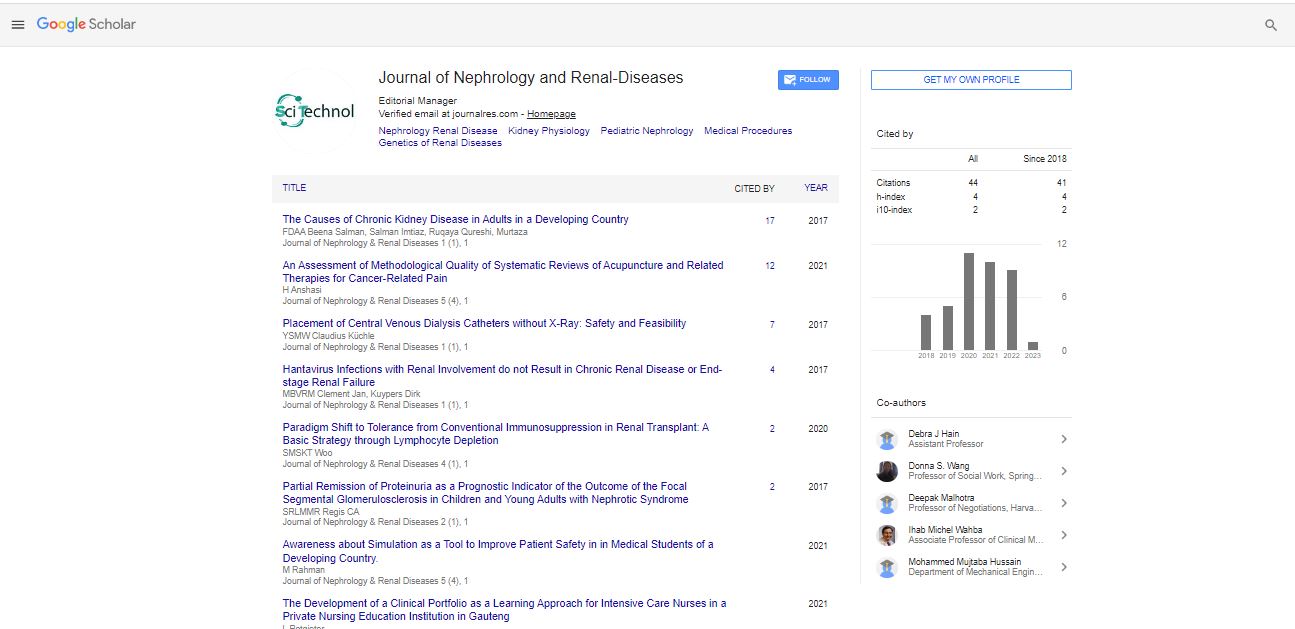Opinion Article, J Nephrol Ren Dis Vol: 7 Issue: 2
Pediatric Nephrology Advances Enhancing Children's Renal Health
Calixto McCarthy*
Department of Pediatrics, University of Rennes, Rennes, France
*Corresponding Author: Calixto McCarthy,
Department of Pediatrics, University
of Rennes, Rennes, France
E-mail: calixcar@uor.fr
Received date: 22 May, 2023, Manuscript No. JNRD-23-107008;
Editor assigned date: 25 May, 2023, PreQC No. JNRD-23-107008 (PQ);
Reviewed date: 08 June, 2023, QC No. JNRD-23-107008;
Revised date: 15 June, 2023, Manuscript No. JNRD-23-107008 (R);
Published date: 22 June, 2023, DOI: 10.4172/2576-3962.1000034
Citation: McCarthy C (2023) Pediatric Nephrology Advances E nhancing Children's Renal H ealth. J Nephrol Ren Dis 7:2.
Description
Pediatric nephrology is a specialized field of medicine dedicated to the diagnosis, treatment and management of kidney disorders in children. Over the years, significant advancements have been made in pediatric nephrology, leading to improved outcomes and quality of life for children with renal conditions.
Kidney disorders in children can manifest in various forms, including congenital abnormalities, urinary tract infections, glomerular diseases, tubular disorders and renal failure. Early detection and prompt intervention are essential for minimizing long-term complications and preserving kidney function. Advances in diagnostic techniques have played a vital role in enhancing the accuracy and timeliness of diagnoses. Imaging modalities such as renal ultrasound, Computed Tomography (CT), and Magnetic Resonance Imaging (MRI) have improved the ability to assess renal anatomy and identify structural abnormalities. Additionally, laboratory tests, including urine analysis, renal function markers, and genetic testing, aid in identifying specific renal disorders and guiding appropriate management strategies.
The multidisciplinary approach to pediatric nephrology has been instrumental in optimizing care for children with kidney diseases. A team of healthcare professionals, including nephrologists, pediatricians, nurses, dietitians, social workers and psychologists, collaborate to provide comprehensive care. This team approach ensures that children receive not only medical treatment but also support for the psychological, nutritional and social needs. The holistic care model considers the child's growth and development, educational needs and psychosocial well-being, recognizing that kidney diseases can have a profound impact on a child's overall health and quality of life.
Treatment modalities in pediatric nephrology have witnessed remarkable advancements, providing customized approaches to meet each child's specific needs. Medications play a vital role in managing various renal conditions. Immunosuppressive agents, such as corticosteroids, calcineurin inhibitors and immunomodulatory drugs, are used to control immune-mediated renal diseases like glomerulonephritis or autoimmune kidney disorders. The development of targeted therapies, including monoclonal antibodies, has revolutionized the treatment of certain renal diseases. These therapies selectively inhibit specific molecular targets, minimizing side effects and improving treatment efficacy.
Renal Replacement Therapies (RRT), including hemodialysis and peritoneal dialysis, are essential for children with End-Stage Renal Disease (ESRD). Advances in RRT techniques and equipment have made dialysis more efficient and comfortable for pediatric patients. Continuous Renal Replacement Therapies (CRRT) provides an alternative to conventional dialysis, offering continuous, gentle filtration ideal for children who are severely ill. Renal transplantation remains the gold standard for children with ESRD. Improvements in surgical techniques, immunosuppression protocols and organ allocation systems have increased the success rates and long-term outcomes of pediatric kidney transplantation.
Genetic analysis has significantly contributed to the inherited renal disorders. Identification of specific gene mutations associated with conditions like Autosomal Dominant Polycystic Kidney Disease (ADPKD) or alport syndrome has facilitated genetic counseling, prenatal testing and preimplantation genetic diagnosis. This knowledge has allowed families to make informed decisions regarding family planning and early intervention for affected children.
Precision medicine considers the unique genetic, environmental and lifestyle factors of each individual to develop personalized treatment plans. Genetic testing, biomarker profiling and pharmacogenomics provide valuable insights into disease mechanisms, treatment response and individualized medication. This approach aims to maximize treatment efficacy while minimizing adverse effects, leading to improved patient outcomes and quality of life.
Conclusion
Pediatric nephrology has made significant advancements in the care and management of kidney disorders in children. Early detection, multidisciplinary care and personalized treatment approaches have improved outcomes and quality of life for children with renal conditions. Advances in diagnostic techniques, treatment modalities, genetic analysis and precision medicine have transformed the field of pediatric nephrology, allowing for specific approaches and improved patient outcomes.
 Spanish
Spanish  Chinese
Chinese  Russian
Russian  German
German  French
French  Japanese
Japanese  Portuguese
Portuguese  Hindi
Hindi 
